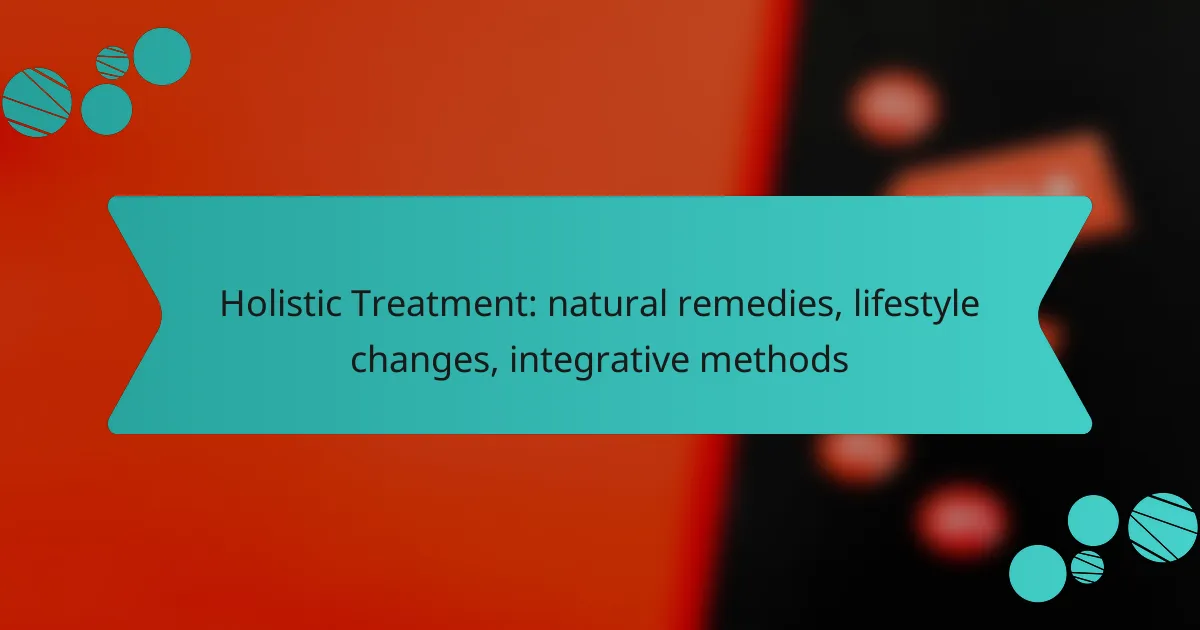Holistic treatment solutions in Canada emphasize a comprehensive approach to health, utilizing natural remedies, lifestyle changes, and integrative methods to foster overall well-being. By addressing the root causes of health issues and focusing on the individual as a whole, these practices aim to enhance physical, emotional, and spiritual health.

What holistic treatment solutions are available in Canada?
In Canada, holistic treatment solutions encompass a variety of natural remedies, lifestyle changes, and integrative methods aimed at promoting overall well-being. These approaches often focus on treating the whole person rather than just specific symptoms, integrating physical, emotional, and spiritual health.
Acupuncture for pain relief
Acupuncture is a traditional Chinese medicine technique that involves inserting thin needles into specific points on the body to alleviate pain. It is commonly used for conditions such as chronic back pain, arthritis, and migraines. Many Canadians find relief through acupuncture, often experiencing reduced pain levels after just a few sessions.
When considering acupuncture, it’s essential to seek a licensed practitioner who follows local regulations. Sessions typically last around 30 to 60 minutes, and patients may need multiple treatments to achieve optimal results.
Herbal medicine for chronic conditions
Herbal medicine utilizes plant-based substances to treat various chronic conditions, including digestive issues, respiratory problems, and inflammation. In Canada, herbal remedies like echinacea for immune support or ginger for digestive health are popular choices. It’s crucial to consult with a healthcare provider before starting any herbal regimen to avoid interactions with prescribed medications.
Many herbal products are available in health food stores and online, but quality can vary. Look for products that are certified organic or have undergone third-party testing to ensure safety and efficacy.
Meditation for stress management
Meditation is a practice that promotes mindfulness and relaxation, helping to manage stress effectively. Techniques can vary from guided imagery to mindfulness meditation, and many Canadians incorporate these practices into their daily routines. Regular meditation can lead to improved emotional well-being and reduced anxiety levels.
To get started, set aside a few minutes each day in a quiet space. Apps and online resources can provide guided sessions, making it easier for beginners to develop a consistent practice.
Yoga for physical and mental well-being
Yoga combines physical postures, breathing exercises, and meditation to enhance both physical and mental health. In Canada, many people practice yoga to improve flexibility, strength, and relaxation. Classes are widely available, catering to all skill levels, from beginners to advanced practitioners.
When starting yoga, consider your fitness level and any physical limitations. Look for classes that emphasize alignment and safety, and don’t hesitate to ask instructors for modifications to accommodate your needs. Regular practice can lead to significant improvements in overall well-being and stress reduction.

How do natural remedies support holistic treatment?
Natural remedies play a significant role in holistic treatment by addressing the root causes of health issues and promoting overall well-being. These remedies often work in conjunction with lifestyle changes and integrative methods to enhance physical, emotional, and spiritual health.
Essential oils for aromatherapy
Essential oils are concentrated plant extracts used in aromatherapy to promote relaxation and healing. They can be inhaled, applied topically, or used in diffusers to create a calming environment. Common oils like lavender, eucalyptus, and peppermint can help reduce stress, improve mood, and alleviate physical discomfort.
When using essential oils, it’s crucial to choose high-quality, pure oils and to perform a patch test before applying them to the skin. Diluting oils with a carrier oil, such as coconut or jojoba oil, can prevent skin irritation. Always consult a healthcare professional if you have underlying health conditions or are pregnant.
Homeopathy for individualized care
Homeopathy is a system of medicine that uses highly diluted substances to stimulate the body’s natural healing processes. It focuses on treating the individual rather than just the symptoms, making it a personalized approach to health. Homeopathic remedies are selected based on a person’s specific symptoms and overall constitution.
To effectively use homeopathy, consider consulting a trained homeopath who can guide you in selecting the appropriate remedies. It’s important to be patient, as homeopathic treatments may take time to show results. Avoid self-prescribing, as improper use can lead to ineffective treatment.
Nutrition for immune support
Nutrition plays a vital role in supporting the immune system and overall health. A balanced diet rich in fruits, vegetables, whole grains, and lean proteins provides essential nutrients that help the body fight infections and maintain energy levels. Key nutrients like vitamin C, zinc, and omega-3 fatty acids are particularly beneficial for immune function.
To enhance your immune support through nutrition, aim to include a variety of colorful foods in your meals. Consider meal prepping to ensure you have healthy options readily available. Avoid excessive sugar and processed foods, as they can weaken the immune response. Regular hydration is also essential for optimal health.

What lifestyle changes enhance holistic health?
Making specific lifestyle changes can significantly improve holistic health by promoting physical, emotional, and mental well-being. Key areas to focus on include regular exercise, mindfulness practices, and sleep hygiene.
Regular exercise for overall wellness
Engaging in regular exercise is essential for enhancing holistic health. Aim for at least 150 minutes of moderate aerobic activity each week, such as brisk walking or cycling, combined with strength training on two or more days. This approach not only boosts physical fitness but also improves mood and reduces stress.
Consider incorporating activities you enjoy, like dancing or swimming, to make exercise more enjoyable. Remember to listen to your body and gradually increase intensity to avoid injury.
Mindfulness practices for emotional balance
Mindfulness practices, such as meditation and yoga, can help maintain emotional balance and reduce anxiety. Spending just a few minutes each day focusing on your breath or engaging in guided meditation can lead to significant improvements in mental clarity and emotional stability.
To get started, try setting aside 10-15 minutes daily for mindfulness exercises. Apps and online resources can provide guided sessions that make it easier to establish a routine.
Sleep hygiene for restorative rest
Good sleep hygiene is crucial for restorative rest and overall health. Aim for 7-9 hours of quality sleep each night by establishing a consistent sleep schedule and creating a calming bedtime routine. Avoid screens and stimulants like caffeine close to bedtime to improve sleep quality.
Consider creating a comfortable sleep environment by keeping your bedroom dark, cool, and quiet. Small changes, such as using blackout curtains or white noise machines, can make a significant difference in your sleep quality.

How do integrative methods combine traditional and alternative therapies?
Integrative methods merge traditional and alternative therapies to create a comprehensive approach to healthcare. This combination allows for a more holistic treatment plan that addresses the physical, emotional, and spiritual aspects of a patient’s well-being.
Collaboration between healthcare providers
Effective collaboration between healthcare providers is essential in integrative methods. This involves communication among doctors, alternative medicine practitioners, and other specialists to ensure a cohesive treatment strategy. For instance, a patient receiving chemotherapy might also consult a nutritionist for dietary support, enhancing overall health during treatment.
To facilitate collaboration, healthcare systems can implement multidisciplinary teams that meet regularly to discuss patient care. This approach helps in sharing insights and aligning treatment goals, ultimately benefiting the patient.
Patient-centered care approaches
Patient-centered care is a core principle of integrative methods, focusing on the individual needs and preferences of patients. This approach encourages patients to actively participate in their treatment plans, promoting a sense of ownership over their health. For example, a patient may choose to incorporate yoga or meditation alongside conventional treatments to manage stress and improve quality of life.
Healthcare providers should prioritize open communication and empathy, ensuring that patients feel heard and respected. Regular feedback from patients can help tailor treatments more effectively, leading to better health outcomes and increased satisfaction with care.

What criteria should you consider when choosing holistic treatments?
When selecting holistic treatments, consider the qualifications of practitioners and the evidence supporting their methods. These factors ensure that the treatments are safe, effective, and tailored to your individual needs.
Qualifications of practitioners
Choosing a qualified practitioner is crucial for effective holistic treatment. Look for professionals with relevant certifications, such as licensed naturopaths, acupuncturists, or practitioners of integrative medicine. Ensure they have completed accredited training programs and possess experience in the specific area of treatment you seek.
Additionally, check for memberships in professional organizations, which often require adherence to ethical standards and ongoing education. This can provide reassurance of their commitment to best practices in holistic care.
Evidence-based practices
Evidence-based practices in holistic treatment involve using methods that have been scientifically validated. Research the effectiveness of specific therapies, such as herbal remedies, acupuncture, or mindfulness techniques, by consulting reputable sources or clinical studies. This helps ensure that the treatments you consider are grounded in reliable evidence.
Be cautious of treatments that lack scientific support or rely heavily on anecdotal evidence. A balanced approach that combines traditional knowledge with contemporary research can lead to more effective outcomes. Always discuss potential treatments with your healthcare provider to align them with your overall health strategy.

What are the benefits of holistic treatment?
Holistic treatment offers a comprehensive approach to health by addressing the physical, emotional, and spiritual aspects of well-being. This method can lead to improved health outcomes, enhanced quality of life, and personalized care strategies that cater to individual needs.
Improved quality of life
Holistic treatment can significantly enhance quality of life by promoting overall wellness rather than merely treating symptoms. By incorporating natural remedies, lifestyle changes, and integrative methods, individuals often experience reduced stress, increased energy levels, and better emotional balance.
For example, practices such as yoga and meditation can improve mental clarity and emotional resilience. Regular physical activity, combined with a balanced diet rich in whole foods, can lead to better physical health and vitality.
Personalized health strategies
Holistic treatment emphasizes personalized health strategies tailored to individual needs and circumstances. This approach considers factors such as lifestyle, diet, and emotional health, allowing for a more effective treatment plan.
Individuals can benefit from consultations with holistic practitioners who assess their unique situations and recommend specific dietary changes, herbal supplements, or stress management techniques. This customization can lead to more effective and sustainable health improvements.
